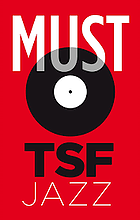Gábor Gadó Quartet Orthodoxia
Gábor likes to think of and describe his music as supplication. This could seem pitiably naive, the self-induced ecstasy of a bigot. But in fact the opposite is true. Gábor composes his music in the way that great mystics pray, for whom prayer is a way of keeping vigil, a form of vigilance rather than a form of devotion. His ascetism has taken him far in the knowledge of the language of harmony, which he combines with admirable skill with the modal roots of Hungarian music developed at the boundary of eastern and western cultures. His extraordinary lucidity creates remarkably appropriate structures, inhabited by our three marvellous free-thinkers. Taking us from dissonance to totally unexpected consonance, he disorients us until our head reels, sweeps us along until we are lost, holds us spell-bound and takes our breath away.
Franck Bergerot, Jazzman
Artists
Gábor Gadó - guitar
Matthieu Donarier - tenor saxophone
Sébastien Boisseau - double bass
Joe Quitzke - drums
About the album
All compositions by Gábor Gadó
Recorded and mixed at Tom-Tom Studio, Budapest
Recorded, mixed and mastered by Attila Kölcsényi
Cover art by Meral Yasar, based on photos by Lenke Szilágyi and István Huszti
Portrait photo: István Huszti
Design: Meral Yasar
Architect: Bachman
Produced by László Gőz
The recording was sponsored by the Ministry of Cultural Heritage and the National Cultural Fund of Hungary
Reviews
Renaud Czarnes - Jazzman - choc (fr)
Michel Bedin - Jazz hot (fr)
Franck Médioni - Jazz magazine (fr)
Michel Contat - Télérama - ffff (fr)
Szigeti Péter - Gramofon **** (hu)
Czabán György Gereblye - Magyar Narancs (hu)
H. Magyar Kornél - Artitura, 2002. december (hu)
H. Magyar Kornél - Artitura, 2003. február (hu)
Deák Attila - Terasz.hu (hu)
Gábor Gadó Quartet: Orthodoxia
The album is available in digital form at our retail partners
July 2002: In the back of the van taking him to Bourgogne where he will be giving a concert in the courtyard of Ratilly Castle, Gábor Gadó is reading. With the intensity of one praying, oblivious to the inconveniences of the journey and the boisterous laughter of his three young companions in front. He plays with them regularly in Paris, where he is now living. They may be young, but they’re well-versed in music. At the wheel, Sébastien Boisseau, the graceful dancer: when he plays, his lines wind liane-like around the flexible tempos of his contrabass. He occupies the place beside percussionist Daniel Humair which was shared for a long time by Henri Texier and Jean-François Jenny-Clark; a bit of both merged into one with a sense of abstraction from which sonorous sounds wrung out of wood and chords well forth, at times to be shattered, pulverized with a stroke of the bow. At his side, Matthieu Donarier: the fluidity of his sound has a way of transforming Gábor’s mournful chords, smoothing them over at the same time as unleashing them. This other young companion of Daniel Humair is also a composer whose music, written for a trio consisting of guitar player Manu Codjia and percussionist Joe Quitzke, is in sympathetic attunement with that of Gábor. Quitzke occupies the third place in front: straight as a yew, built like a yogi, a peachy-skinned rhythmic machine whose tender touch brings out a great variety of timbres from the drumhead while maintining a tempo detailed with the precise, measured gestures of a watchmaker. Aldo Romano, Daniel Humair, Aaron Scott were his predecessors at the side of saxophone-player Francois Jeanneau...but there is no need for references, Gábor has surrounded himself with three free-thinkers.
Having arrived at Ratilly Castle in the mid-July heat we decide to take a rest, lying down in the fresh grass at the foot of the only wall still in shade. Gábor sits in a white armchair in the middle of the courtyard. Stripped to the waist, his head protected by a straw hat, he resumes his reading – as if absorbing from literature what his body is exuding under the merciless glare of the sun. Half asleep, looking up at him from our recumbent position on the ground, his body appears to be levitating upside-down over the grass, the way you sometimes see yourself mirrored in the sky in the heat-haze of the hottest days of summer on the Puszta, the Great Plain of Hungary.
Dusk falls. By the time the concert begins the courtyard of the castle becomes the Unknown Kingdom, (the title of an album as yet unreleased) inspired by Gábor’s reading of Alain-Fournier’s Le Grand Meaulnes.
Later on, the guitar player takes his companions to Hungary to record their new repertoire. One month later, the album is ready. As I take up my pen to write these notes to the booklet, I expect Gábor to furnish me with the details of his music, the way he writes it down, the way he builds up his compositions, the nature of the famous guitar arpeggios that Matthieu Donarier explores tirelessly and passionately on his saxophone in between concerts in the hope of unravelling their mysteries.
Instead, Gábor offers me books, sends me photocopied pages from The Brothers Karamazov, draws my attention to the legend of the Grand Inquisitor, quotes Berdiaev. The titles of his compositions speak for themselves: Malte Laurids Brigge (Rilke), Syberiada (in memory of Joseph Brodsky).
Gábor’s imagination is fired by writers. But listening to his music and abstracting from its vocabulary, adopted from jazz, one is also reminded of composers David Schnitke, Sofia Gubaidulina or Arvo Pärt. And the reference to director Andrei Tarkovski and Stalker comes as no surprise. It appears that Gábor’s imagination is rooted in Eastern Europe, in orthodox ground. The title Orthodoxia refers not so much to the religion as to the troubled spirituality that unfolded under its aegis. Gábor turns to it to find models of reflection and expression for the thoughts and feelings that torment him: a faith that is unshakable without being dogmatic confronting a world that has been deserted by a faceless God, the drama of coexistence in a world of incommunicability, the necessity of a free conscience threatened by the influence of evil.
Gábor likes to think of and describe his music as supplication. This could seem pitiably naive, the self-induced ecstasy of a bigot. But in fact the opposite is true. Gábor composes his music in the way that great mystics pray, for whom prayer is a way of keeping vigil, a form of vigilance rather than a form of devotion. His ascetism has taken him far in the knowledge of the language of harmony, which he combines with admirable skill with the modal roots of Hungarian music developed at the boundary of eastern and western cultures. His extraordinary lucidity creates remarkably appropriate structures, inhabited by our three marvellous free-thinkers. Taking us from dissonance to totally unexpected consonance, he disorients us until our head reels, sweeps us along until we are lost, holds us spell-bound and takes our breath away.
Franck Bergerot
Jazzman
translated by Eszter Molnár, Fruzsina Balkay


